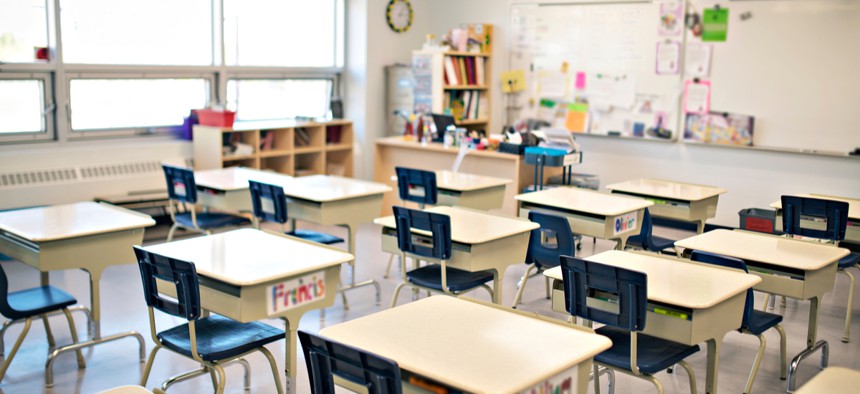A Significant Share of Teachers Say They Won’t Return to In-Person Classes if Schools Reopen This Fall

New polling found that teachers are wary of returning to the classroom. Shutterstock
New polling shows both parents and teachers are wary of returning to normal in fall, with almost one in five teachers saying they would leave their job if asked to return to the classroom with students.
As reopening begins, schools are seen as one of the top priorities for state and local officials who hope to return to a life closer to normal after the initial, massive economic disruption of the coronavirus pandemic.
But as governors consider lifting school closure mandates—a process that has already begun in some states—teachers seem to be expressing hesitancy about returning to the classroom anytime soon or even for the next school year.
New polling from USA TODAY and Ipsos found that some teachers are concerned that even a return date in fall is still too risky. Roughly one in five (18%) of teachers surveyed said they would leave their job if asked to return in-person in the fall. Among those 55 and older, which correlates to the teachers with the most experience, as well as the ones who might be more susceptible to complications from the coronavirus due to their age, the number rose to one in four (25%).
The data comes from a poll of 505 educators who teach kindergarten through high school. They were surveyed between May 18 to 21.
Cliff Young, the president of Ipsos, said in a statement that teachers still have unresolved questions about what measures need to be taken before classrooms can safely reopen. "As our world has changed, almost everything we do has changed, including how we view and approach education,” he said. “Though Americans are optimistic about a return to in-person learning, there is angst among teachers, parents and America at large about how to keep our schools safe if the virus isn’t fully contained.”
Forty-three states and the District of Columbia have said that schools should remain closed at least through the end of this academic year, though President Trump has repeatedly pushed officials to reconsider these plans. On Sunday, he tweeted that "schools in our country should be opened ASAP."
Trump’s wish to reopen schools has been a source of concern for some in the education field. The National Education Association urged schools to listen “to the health experts and educators on how and when to reopen schools—not the whims of Donald Trump.” The American Federation of Teachers said that “the input of educators and healthcare workers, as well as parents, is crucial in making any reopening plan work.”
Even as states begin broader reopening efforts, it seems likely that most schools will remain closed through the end of this academic year—but 65% of teachers said that they believe it is very or somewhat likely that their schools will reopen in fall.
The White House in April issued guidance for what precautions schools could take when they reopen, including limiting time in communal spaces like gyms and cafeterias, spacing desks farther apart, directing hallway traffic in only one direction, reducing the capacity on buses, and asking teachers and students to wear masks. Among the list of other options school officials are considering include taking students’ temperatures before they enter and implementing a half-virtual, half-in-person model where some students come to school on certain days.
The Ispos poll found that 69% of teachers supported the idea of returning for two or three days per week, a measure also supported by two-thirds of the 403 parents who were surveyed. Some states are already starting to plan for this scenario. Colorado Gov. Jared Polis said that the upcoming academic year will not “look like any other school year” and that schools will likely close periodically when “there’s an inevitable outbreak.” California Gov. Gavin Newsom similarly said that students will likely be staggered “as cohorts in the morning and others in the afternoons.”
Only 49% of teachers said they support a full return to school before a vaccine is available—something that experts say isn’t likely to happen until the end of 2020 at the earliest, and is more likely to arrive in 2021. Just over half of parents surveyed (53%) said that they would support a return to the classroom before a vaccine.
In mid-May, Dr. Anthony Fauci, the country’s leading advisor on the coronavirus response, said that a vaccine is “absolutely not” required for schools to reopen. Instead, he said schools should set up infrastructure now so that they are able to “respond effectively and efficiently” should any students or teachers become ill after returning in fall.
Both parents and teachers expressed concerns over schools’ abilities to control the spread of the virus. While 78% of teachers said they would wear a mask and 70% of parents said they would put masks on their children, 68% of parents and 87% of teachers said that it is unlikely that educators would be able to enforce any kind of social distancing between students. Experts say that combining social distancing with masks is the most comprehensive strategy for containing the virus.
Colin Sharkey, the executive director of the Association of American Educators, a nonpartisan and nonunion association in the field, said that the survey results mirror earlier findings from his group that determined 67% of educators hope to continue using distance learning tools once schools reopen. “The [Ispos] survey confirms that teachers, who adapted heroically to school closures, ensuring children are fed and salvaging the school year as best they could, are willing to adapt schools to the needs of the education community,” he said.
Emma Coleman is the assistant editor for Route Fifty.
NEXT STORY: Governors Ask Residents to Stop Mask-Shaming






